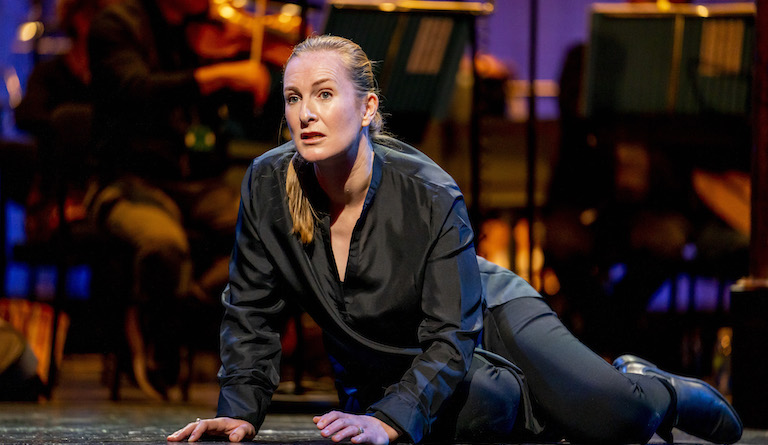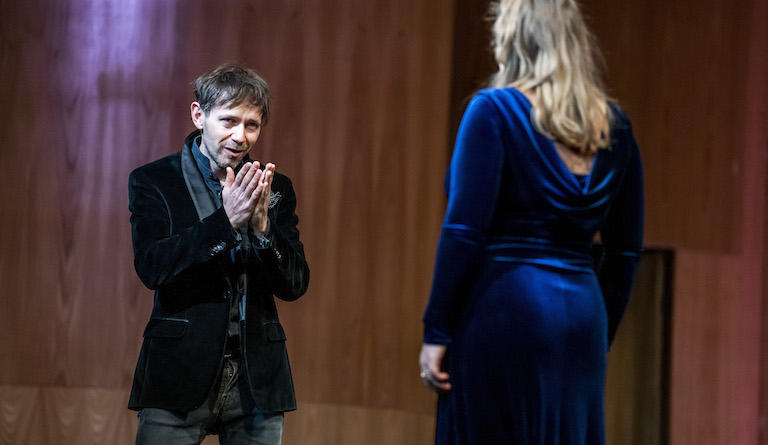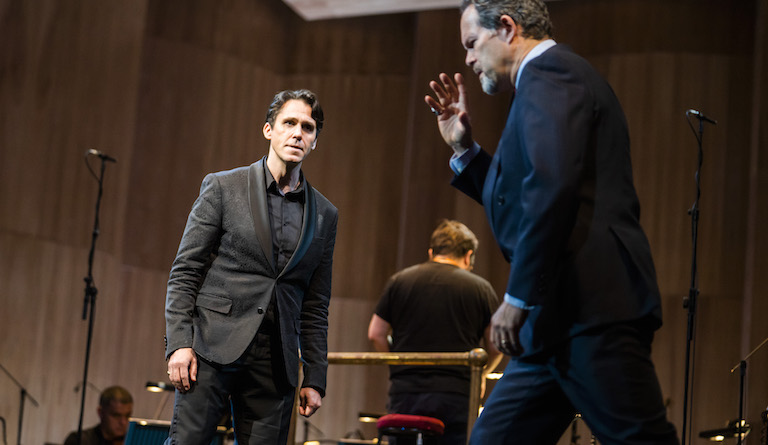Ariodante, Royal Opera House online: review ★★★★★
Long-awaited return to Covent Garden of Handel's fine opera, streamed with an all-star cast
Chen Reiss is the wronged Ginevra in Ariodante. Photo: Tristram Kenton
In this tortoise phase of our new, stop-go lives, it is entertaining to be reminded of the giddy London of 1735. No wifi, no click-and-collect to cut corners, it's true. But careering around in carriages, hoofing it from his house in Brook Street to the West End, the German-born composer George Frideric Handel kept up a punishing schedule.
Demand for new opera, with dazzling vocal acrobatics and spectacular visual effects, was insatiable. Singers would be learning one new piece, virtually as it was being written, while performing another, and theatre managers wanted more, more, more. The bubble burst, as all bubbles will, as fashions and tastes changed, but mid-18th-century audiences had a high old time.
Ariodante was written in the heat of this frenzy, staged in Covent Garden in 1735, given a make-over and re-staged. Joining the show was a star castrato who, waltzing in without the time, or possibly the inclination, to learn new material, simply dropped in arias he already knew, by another composer. Ariodante has never been seen there since. Until this week.

Paula Murrihy sings the title role in Ariodante. Photo: Tristram Kenton
A very palatable mid-point between the small comfort of our sofas and the firework show of a no-holds-barred Handel opera production is the concert performance, as chosen by the Royal Opera House in reviving Ariodante. Keeping up the conversation between the house and its audience, which waits patiently for a fully-fledged live programme, here is top-class singing from great communicators.
Streaming by many resourceful music-makers over the past few months has proved the vital importance of remembering that there is an invisible audience trying to connect with the artists. Arguably this is easier for singers than for instrumentalists, with words to impart. Nonetheless, it is striking that the three biggest successes in streaming recently have been the ROH's 4/4, English National Opera's performance of Mozart's Requiem, and now this Ariodante.
While many of the cast are familiar ROH faces, it was refreshing to see in the title role, Irish mezzo-soprano Paula Murrihy making her ROH debut and, as Ariodante's adored Ginevra, Israeli soprano Chen Reiss, making a stupendous Covent Garden role.
Cue a great supporting cast: soprano Sophie Bevan as Ginevra's confidante Dalinda, counter-tenor Iestyn Davies wonderfully seedy as a thwarted and vengeful suitor, tenor Ed Lyon as Ariodante's good-hearted brother, bass-baritone Gerald Finley as the King of Scotland, where the action nominally takes place, and Jette Parker artist Thando Mjandana as the King's right-hand man.

Unscrupulous Polinesso (Iestyn Davies) persuades Dalinda (Sophie Bevan) to compromise her mistress. Photo: Tristram Kenton
The storyline is the same as the sub-plot of Much Ado About Nothing. On the eve of the wedding between Ariodante and Ginevra, jealous Polinesso takes advantage of Dalinda's crush on him and persuades her to dress as Ginevra, to be discovered by Ariodante, who believes his beloved to be unfaithful. Ariodante tries to end his own life, while Ginevra is condemned to death by the King. Ariodante's survival and Dalinda's confession set up the happy ending.
Christian Curnyn directs the Orchestra of the Royal Opera House on stage behind the singers, with particularly luscious playing from the bassoon and theorbo. Who could ask for anything more? Well, me actually.... Try as I might, I cannot find on the ROH website who was responsible for the atmospheric lighting, or the stage design which turned the ROH into a stylish concert hall, or whether there was a director as such, or whether it was the artists' own experience and talent that gave the performance such flair.
Bombarded with wearisome news, we are hungry for information and stories from other realms. Please treat your audience, ROH, to all the gen you can share from behind your much-missed Bow Street doors. (Thoughtful company manager Ruth Mulholland has subsequently tweeted the answers: the director was Isabelle Kettle, the lighting designer was Simon Bennison.)

Lurcanio (Ed Lyon) reasons with the King (Gerald Finley). Photo: Tristram Kenton
In the meantime, the simple joy of this occasion is heart-warming. But wonderful as it is to see these top-flight musicians in their element, let's not forget the plight of the many performers and creatives who have nothing to live on, completely ignored by the Chancellor. There are thousands and thousands of them among the three million self-employed left to their own devices, and Brexit is about to damage their prospects even further.
Compare this with Handel's time. Money was tight, even then, of course. The composer, given British nationality under George II, found a willing patron for Ariodante. He played some of his new opera through to the king, who promptly stumped up £1000. In today's money that's about £250,000. For one show. Hear that, Mr Sunak?
Ariodante is screened at 7:30pm on Friday 20 November and is available to view until 20 December. Click here for a Royal Opera House log-in, and here to view
Demand for new opera, with dazzling vocal acrobatics and spectacular visual effects, was insatiable. Singers would be learning one new piece, virtually as it was being written, while performing another, and theatre managers wanted more, more, more. The bubble burst, as all bubbles will, as fashions and tastes changed, but mid-18th-century audiences had a high old time.
Ariodante was written in the heat of this frenzy, staged in Covent Garden in 1735, given a make-over and re-staged. Joining the show was a star castrato who, waltzing in without the time, or possibly the inclination, to learn new material, simply dropped in arias he already knew, by another composer. Ariodante has never been seen there since. Until this week.

Paula Murrihy sings the title role in Ariodante. Photo: Tristram Kenton
A very palatable mid-point between the small comfort of our sofas and the firework show of a no-holds-barred Handel opera production is the concert performance, as chosen by the Royal Opera House in reviving Ariodante. Keeping up the conversation between the house and its audience, which waits patiently for a fully-fledged live programme, here is top-class singing from great communicators.
Streaming by many resourceful music-makers over the past few months has proved the vital importance of remembering that there is an invisible audience trying to connect with the artists. Arguably this is easier for singers than for instrumentalists, with words to impart. Nonetheless, it is striking that the three biggest successes in streaming recently have been the ROH's 4/4, English National Opera's performance of Mozart's Requiem, and now this Ariodante.
While many of the cast are familiar ROH faces, it was refreshing to see in the title role, Irish mezzo-soprano Paula Murrihy making her ROH debut and, as Ariodante's adored Ginevra, Israeli soprano Chen Reiss, making a stupendous Covent Garden role.
Cue a great supporting cast: soprano Sophie Bevan as Ginevra's confidante Dalinda, counter-tenor Iestyn Davies wonderfully seedy as a thwarted and vengeful suitor, tenor Ed Lyon as Ariodante's good-hearted brother, bass-baritone Gerald Finley as the King of Scotland, where the action nominally takes place, and Jette Parker artist Thando Mjandana as the King's right-hand man.

Unscrupulous Polinesso (Iestyn Davies) persuades Dalinda (Sophie Bevan) to compromise her mistress. Photo: Tristram Kenton
The storyline is the same as the sub-plot of Much Ado About Nothing. On the eve of the wedding between Ariodante and Ginevra, jealous Polinesso takes advantage of Dalinda's crush on him and persuades her to dress as Ginevra, to be discovered by Ariodante, who believes his beloved to be unfaithful. Ariodante tries to end his own life, while Ginevra is condemned to death by the King. Ariodante's survival and Dalinda's confession set up the happy ending.
Christian Curnyn directs the Orchestra of the Royal Opera House on stage behind the singers, with particularly luscious playing from the bassoon and theorbo. Who could ask for anything more? Well, me actually.... Try as I might, I cannot find on the ROH website who was responsible for the atmospheric lighting, or the stage design which turned the ROH into a stylish concert hall, or whether there was a director as such, or whether it was the artists' own experience and talent that gave the performance such flair.
Bombarded with wearisome news, we are hungry for information and stories from other realms. Please treat your audience, ROH, to all the gen you can share from behind your much-missed Bow Street doors. (Thoughtful company manager Ruth Mulholland has subsequently tweeted the answers: the director was Isabelle Kettle, the lighting designer was Simon Bennison.)

Lurcanio (Ed Lyon) reasons with the King (Gerald Finley). Photo: Tristram Kenton
In the meantime, the simple joy of this occasion is heart-warming. But wonderful as it is to see these top-flight musicians in their element, let's not forget the plight of the many performers and creatives who have nothing to live on, completely ignored by the Chancellor. There are thousands and thousands of them among the three million self-employed left to their own devices, and Brexit is about to damage their prospects even further.
Compare this with Handel's time. Money was tight, even then, of course. The composer, given British nationality under George II, found a willing patron for Ariodante. He played some of his new opera through to the king, who promptly stumped up £1000. In today's money that's about £250,000. For one show. Hear that, Mr Sunak?
Ariodante is screened at 7:30pm on Friday 20 November and is available to view until 20 December. Click here for a Royal Opera House log-in, and here to view
TRY CULTURE WHISPER
Receive free tickets & insider tips to unlock the best of London — direct to your inbox
| What | Ariodante, Royal Opera House online: review |
| When |
On 20 Nov 20, Live-streamed at 7:30PM, then available to subscribers until 20 Dec |
| Price | £10 |
| Website | Click here for more information and booking |